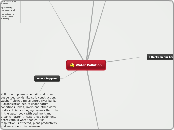Water Pollution
Effects of water pollution
Many bodies of water near urban areas are highly polluted. This is the result of both garbage dumped by individuals and dangerous chemicals legally or illegally dumped by industries.
The main problem caused by water pollution is that it kills life that inhabits water-based ecosystems. Dead fish, birds, dolphins, and many other animals often wind up on beaches, killed by pollutants in their habitat.
Pollution disrupts the natural food chain as well. Pollutants such as lead and cadmium are eaten by tiny animals. Later, these animals are consumed by fish and shellfish, and the food chain continues to be disrupted at all higher levels.
Eventually, humans are affected by this process as well. People can get diseases such as hepatitis by eating seafood that has been poisoned.
Ecosystems can be severely changed or destroyed by water pollution. Many areas are now being affected by careless human pollution, and this pollution is coming back to hurt humans.
Causes of water pollution
Chemical
Agricultural and Industrial work has the use of many chemicals that can run-off into water and pollute it. Metals and solvents from industrial work pollute rivers and lakes. Aquatic life is endangered by these and made infertile. Pesticides are used to control weeds, insects and fungi. Run-off's of these pesticides poisons aquatic life. If birds, humans and other animals eat infected fish they may be poisoned. Petroleum is a different type of chemical pollutant that pollutes water by oil spills in case a ship ruptures. Oil spills have a localised affect on wildlife, but can spread for miles. This oil can effect the death of many fish and stick to the feathers of seabirds. This loses their ability to fly.
Agriculture
A wide range of contaminants can reach the river either via groundwater or through drainage ditches, including artificial fertilizer residues, insecticides, herbicides, pesticides and farmyard waste, all of which are potentially very harmful.
Effects on our health
Virtually all types of water pollution are harmful to the health of humans and animals. Water pollution may not damage our health immediately but can be harmful after long term exposure. Different forms of pollutants affect the health of animals in different ways:
Heavy metals from industrial processes can accumulate in nearby lakes and rivers. These are toxic to marine life such as fish and shellfish, and subsequently to the humans who eat them. Heavy metals can slow development; result in birth defects and some are carcinogenic.
Industrial waste often contains many toxic compounds that damage the health of aquatic animals and those who eat them. Some of the toxins in industrial waste may only have a mild effect whereas other can be fatal. They can cause immune suppression, reproductive failure or acute poisoning.
Microbial pollutants from sewage often result in infectious diseases that infect aquatic life and terrestrial life through drinking water. Microbial water pollution is a major problem in the developing world, with diseases such as cholera and typhoid fever being the primary cause of infant mortality.
Organic matter and nutrients causes an increase in aerobic algae and depletes oxygen from the water column. This causes the suffocation of fish and other aquatic organisms.
Sulfate particles from acid rain can cause harm the health of marine life in the rivers and lakes it contaminates, and can result in mortality.
Suspended particles in freshwater reduces the quality of drinking water for humans and the aquatic environment for marine life. Suspended particles can often reduce the amount of sunlight penetrating the water, disrupting the growth of photosynthetic plants and micro-organisms.
Consequences
Effects on Ecosystem
Water pollution has effects on both physical and chemical properties of water leading to hazardous effects on the dependent lifeforms in water.
Different species living in water can get killed due to water pollution disrupting the entire ecosystem.
Loss of any of the species can cause domino effect on other dependant species as well.
The marine life also gets hampered due to the dumping of toxic effluents into the water.
Effects on Human Life
Water pollution can cause certain waterborne diseases like diarrhea, typhoid, cholera, and jaundice.
These can be caused due to the dumping of human wastes and sewage water.
It also causes a few other effects on blood circulation, nervous system and sometimes cancer as well.
Drinking contaminated water for longer period of time can damage the liver and kidneys of a person.
Toxic water can result in causing skin disorders, ulcers, tumors etc.
Make sure that you drink purified water in order to avoid the above mentioned infections and diseases.
Prevention
Conserve water by turning off the tap when running water is not necessary. This helps prevent water shortages and reduces the amount of contaminated water that needs treatment.
Be careful about what you throw down your sink or toilet. Don’t throw paints, oils or other forms of litter down the drain.
Use environmentally household products, such as washing powder, household cleaning agents and toiletries.
Take great care not to overuse pesticides and fertilisers. This will prevent runoffs of the material into nearby water sources.
By having more plants in your garden you are preventing fertiliser, pesticides and contaminated water from running off into nearby water sources.
Don’t throw litter into rivers, lakes or oceans. Help clean up any litter you see on beaches or in rivers and lakes, make sure it is safe to collect the litter and put it in a nearby dustbin.
How it happens
Pollution happens when silt and other suspended solids like soil, construction, washoff plowed fields enters river banks. Eutrophication occurs under natural conditions, lakes, rivers and other water bodies. This is an aging process that fills in the water body with sediment and organic matter. In case these sediments enter various water bodies, fish respiration is affected, plant productivity and water depth is decreased.
